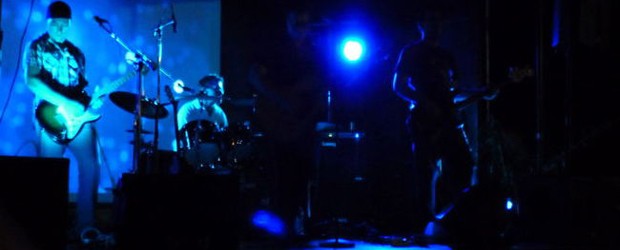Supersystem
When done well, [political music] can be really good. It helps if you’re an old weird burnt-out dude writing about a war you were in as opposed to some white kid.
story by Jay Gentile
It’s a Saturday afternoon in New Jersey, and Supersystem keyboardist Pete Cafarella is lost in Ikea. He’s talking to Chicago Innerview while desperately searching the sprawling furniture complex for his girlfriend. He’s just encountered a “really intense” part of the superstore: the kitchen display, where apparently crazed holiday shoppers are boxing each other out to get their hands on the newest no-stick cooking utensil. He seems a bit freaked out, but maintains his cool composure and carries on with the interview.
The quick background: Supersystem makes dance punk music of the type that The Rapture has been credited with inventing. They used to be called El Guapo, but changed the name after some cheesy Chicago rock band claimed rights to the name. They left their former label, Washington D.C.’s Dischord, for Chicago’s Touch & Go to release their fifth LP, Always Never Again, last spring.
The first time I saw these guys live, at Chicago’s Hideout around the time of the release, the power went out midway through their set. The power came back on, asses again started to shake and then…the power went out again. I ask Pete what the hell their problem was, and he fesses up like a man instead of trying to pin it on the venue. “I take full responsibility,” he says. “We probably plugged too many amps into one circuit.”
With half of the band currently still residing in D.C. and the other half (including Cafarella) taking up shop in Brooklyn (where the album was recorded), the record has attracted some “political” characterizations for the 9/11 geographic connection and often vaguely political lyrics. I ask Pete if he considers Supersystem a “political” band. “It’s political in the sense that it was made by three privileged white kids for other privileged youths in the early 2000s,” he replies. When asked if there is a role for politics in music, he says, “when done well, [political music] can be really good. It helps if you’re an old weird burnt-out dude writing about a war you were in as opposed to some white kid.” He finds the current crop of political music a-la Conor Oberst “a bit disingenuous.”
What then, pray tell, is the “purpose” of this particular band of musicians, I ask Cafarella, who is still scanning Ikea’s savage landscape for any sign of his girlfriend and/or on-sale oven mitts. “We want to abolish racism,” he replies. A noble goal indeed, but I’m looking for something just a bit less sarcastic. Is it, perhaps, to drive hipsters to dance as part of this new phenomenon that so many likeminded dance punk bands from LCD Soundsystem on have been characterized as heralding?
“My dad doesn’t dance,” says Cafarella. “When we get the dad’s to dance, then we’ll have achieved our goals.” He adds: “And if you’re a true hipster, you do dance and smile.” What a revolutionary concept. Empty Bottle please take note.
Seeking more enlightening passages from a young man just trying to get out of Ikea alive, I move on to the song “Everybody Sings” from Always Never Again, which features Molly Schnick from Out Hud as well as provocative lyrics such as, “Do you feel a connection with everyone alive?” The answer, according to the song, is, “Yes and no.” So, does Cafarella believe we are all connected then or not? “As far as we’re all social beings, but I don’t necessarily believe in any spiritual unity,” he says. When asked if music has the capacity to provide such a unity, he answers, “possibly.”
When asked for a characterization of the whole dance rock genre so popular amongst the kiddies today, Cafarella offers this: “I want all bands and people to get along in whatever context they’re operating within. It’s a genre of music that’s really fun and exciting, but at the same time totally generic and played-out and lame.”
While I like the album overall, I found myself wanting to like it more than I actually did. Yet it is a decent and worthy album by a band in transition (having added new member Joshua Blair on drums in addition to the name change and label swap) that hints at the ability for greater things to come. And it’s good to know they’ll still be offering music as we continue to search for the definitive dance rock album of our time.
Yet Supersystem still has a lot of work to do. And they still haven’t abolished racism, although I may have seen a few dads dancing at their show, so at least they’re making progress.
Supersystem :: with French Toast, Call Me Lightning and Disc Jockey CB :: Empty Bottle :: January 12.




